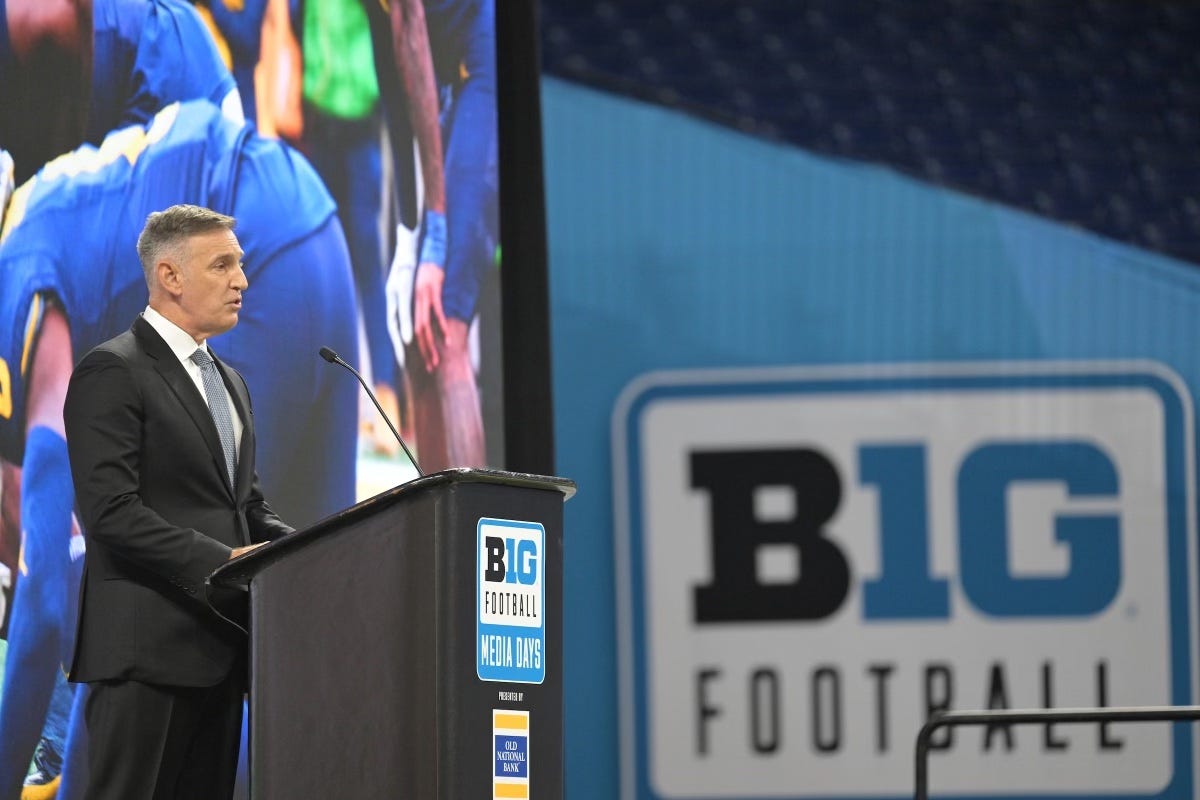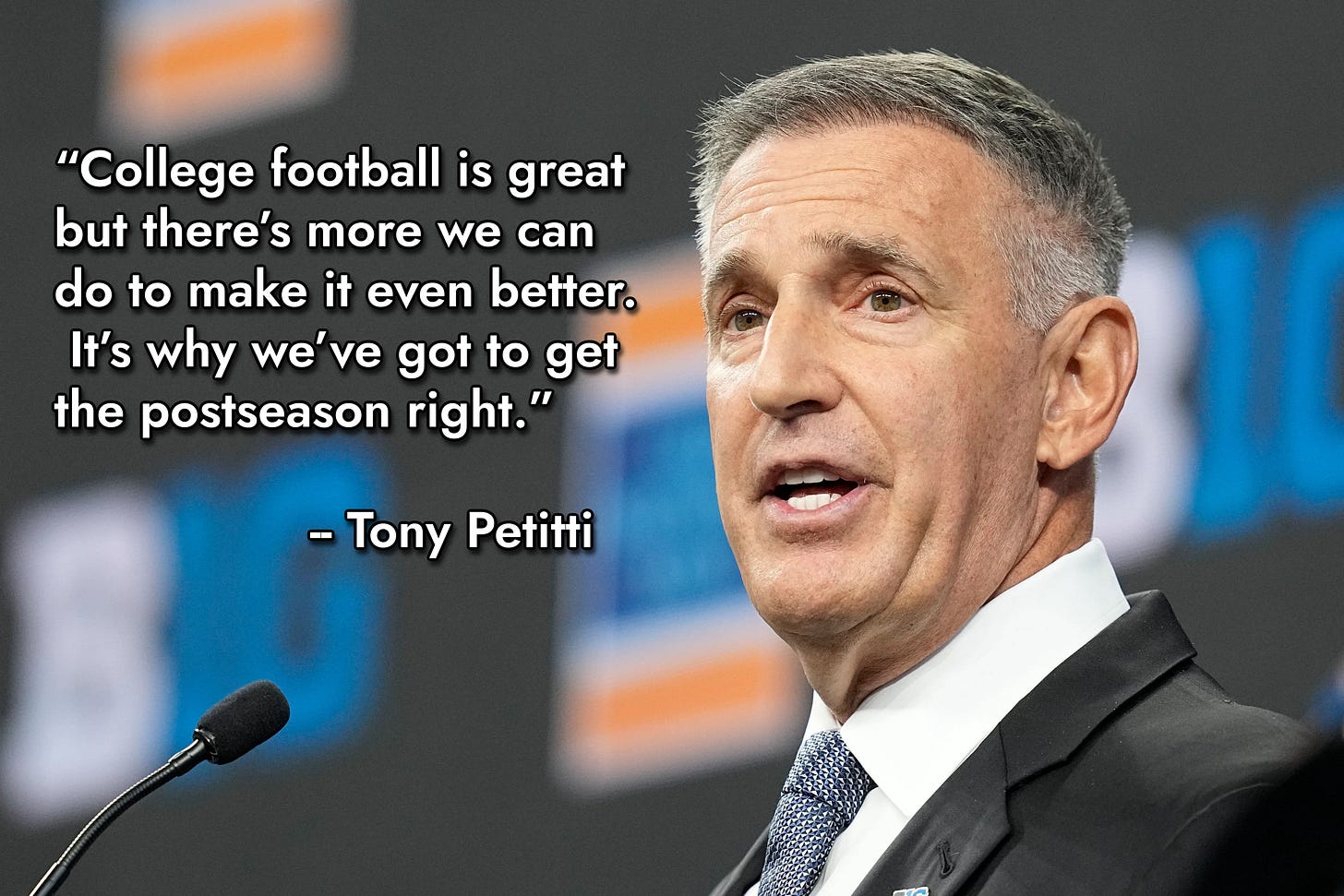Canzano: A sit down with the Big Ten's Tony Petitti
Going behind the curtain with the Big Ten Commissioner.
INDIANAPOLIS — It was time for a sit-down. So I met Tony Petitti’s handler in one of the end zones at Lucas Oil Stadium on Tuesday. I was escorted through the stadium tunnel, down a hallway, to a small room where the Big Ten Conference commissioner sat in a cushioned chair.
I slid into the empty seat beside him.
It’s Big Ten Football Media Days. Petitti opened the event earlier on Tuesday by addressing the league’s media contingent from the stage. Among other topics, he was asked about the four Pac-12 schools joining his conference and whether the Big Ten has an appetite for more expansion. But in our first 1-on-1 conversation, I wanted to start with something closer to home — his father.
John Petitti was a New York City cop. He played on the precinct softball team and worked in the late 1960s and early 1970s on the Tactical Patrol Force. That patrol started at 6 p.m. and ended at 2 a.m. The uniformed officers would bus into the roughest neighborhoods in the city, dropping into high-crime areas on foot.
The officers were given a list of directives. The orders were put in writing in a New York City Police Department memorandum in 1967:
Protect life and property.
Prevent crime.
Detect and arrest offenders.
Enforce all laws, ordinances, and provisions of the Administrative Code over which the Police Department has jurisdiction.
Tony told me on Tuesday: “It was tough as you can imagine, but I just thought my Dad had the best job in the world.”
Tony Petitti has been on the job as commissioner of the Big Ten since April 2023, when he replaced Kevin Warren. TurnkeyZRG, the same search firm that found George Kliavkoff for the Pac-12 and recommended Brett Yormark to the Big 12, brought Petitti to the Big Ten.
These weren’t typical conference commissioners who earned their chops on college campuses. All three were industry outsiders, viewed as new-world hires. Petitti was in charge of the NFL coverage on CBS and built the MLB Network. Kliavkoff helped launch Hulu and was the head of MGM Entertainment. And Yormark is a skilled salesman and marketer with a background in the entertainment world.
As Petitti talked with me on Tuesday, I wondered how different college football might be today if that search firm had tossed those three candidates into a cup as if they were dice, shaken it, and scattered them into each other’s jobs.
Kliavkoff as the head of the Big Ten?
Yormark leading the Pac-12?
Petitti as the Big 12 czar?
As barstool discussions go, that’s a fun one. Would swapping conference leadership have made a difference? Or was the outcome inevitable? Tuesday was no time for ‘what ifs’ because it was the first day of the Big Ten’s three-day media event. Petitti’s conference found itself at the NFL stadium, ankle-deep in reporters eager to talk about the upcoming football season, not the past.
Six coaches were interviewed on stage on Tuesday. A half-dozen more will step into the spotlight on Wednesday and another six on Thursday. In our conversation, I asked the Big Ten commissioner about a variety of issues and topics swirling around college football.
Among them…
Petitti on whether all the changes in college sports serve a greater good:
“Student-athletes are in a better position. There’s an opportunity for scholarships to grow. There’s an opportunity for direct compensation. There’s still the right to have NIL. All of that comes with maintaining the educational benefits. I understand that people will say that football has changed the conference affiliation so there are scheduling concerns (in other sports) about traveling. Football is the ecosystem that drives a lot of this. We all understand that. But overall, student-athletes are in a better position today. You’re around them a lot. I think you’d agree. They want to play the best. They want to test themselves against the best. They want to see these iconic places. I talked to some of the players at Rutgers about getting the chance to play in the Los Angeles Coliseum, and for some of our (Big Ten) athletes to go to the Rose Bowl, and for kids from the West Coast to go play in the ‘white-out’ game (at Penn State). I think that means something. We’ve got to get it right in the other sports, but I think this new model is positioned to be better for student-athletes.”
Petitti on the importance of having balance between the college football regular season and its postseason:
“What I care about with the postseason in football is that it has to improve the regular season. I don’t like the idea of thinking of them as two separate things. What I want is as many meaningful games as late in the season in the Big Ten with the fact that if you’re winning those games determines whether you’re in (the playoff) or not.”
On how big the College Football Playoff is going to be:
“I’m excited. You can go back and look at the last 10 years. There’s a little bit of phony math because you don’t know who would have won with these new conferences, but you can start putting together some of these on-campus matchups in the first round and it’s pretty spectacular. You’ll see some cold weather. You’ll see some warm weather. You’ll see a little bit of everything. Ultimately, it will be a really good system and I think fans will gravitate toward it.”
On how G5 schools with leaner athletic department budgets might expect to compete with schools that have more resources (i.e. Ohio State) in an expanded College Football Playoff:
“There are lots of places in the NCAA where participation in something bigger is thought of as the prize. Basketball has automatic qualifiers from the small leagues. That’s a reward for doing (well). Do they win sometimes? Absolutely. Do they lose more often? Most likely. You see that. But that’s part of what’s been guaranteed in the CFP, just giving access. The competitive aspect of that over time, we’ll see, but that (access) was guaranteed and I thought that was really important.”
On predicting developments in the sports media-rights world:
“I worked in media for a long time and I can tell you it’s hard to predict what’s going to happen. I don’t have any specific insight. A lot of my friends work at those places and they don’t know. The way to think about it from the Big Ten’s side is that college football is going to be incredibly important. It’s going to reach lots of people. I want to make sure as distribution changes that the Big Ten is positioned to be healthy and thought of at the very front of the line. It doesn’t mean others can’t be right there with us. What can we do to make sure that the matchups, the reach, the engagement, the history, etc. are all happening? As distribution changes, I’m less about predicting that than controlling what we can control. We’re blessed to have large institutions with lots of fans, and great history, and I really believe in what we did in terms of the four new teams if you look at the schedule — that’s the way I think about it.”
On what metrics should we use to measure the health of college football:
“Not to get too personal with you, but you’ve built something (at JohnCanzano.com) that is built on the passion of people who love college sports — mainly football, right? You can see the engagement you can generate off that passion. So that’s part of it. What’s happening at the stadiums in terms of attendance? And growth? And interest? College football is great but there’s more we can do to make it even better. It’s why we’ve got to get the postseason right.”
Hours earlier, Petitti was asked on stage if the Big Ten still had an appetite for expansion. Would it ever expand to 20 teams or more? Petitti waved the question off and said, “We’re focused on the 18 right now. We’re comfortable where we are.” He also said the Big Ten was focused on a smooth “onboard” of newcomers Oregon, Washington, UCLA, and USC. That officially happens on Aug. 2.
Our 1-on-1 conversation was wide-ranging and lasted 20 minutes. We bounced between talking about his family, his career, and his football conference.
Petitti has two daughters, Danielle and Ally. They’re grown now. One graduated from Vanderbilt, the other from USC. But he told me about going to Disneyworld with them when they were little kids. He said: “There was no roller coaster too high for them — and they had a dad who hated heights.”
He also spoke about being the son of first-generation American immigrants and the first in his family to graduate college. Petitti has two younger sisters. Their parents made sacrifices and valued education and opportunities. Petitti’s mother worked nights at a savings bank in the local mall. But it’s his father I left our conversation thinking about.
John Petitti died in January 2004, a few weeks before his son got to work as the executive producer of his first Super Bowl. The former cop who worked that tough graveyard shift, policing the neighborhoods of New York was proud of his TV-producer son. He’d tune into CBS on Sundays and listen closely at the end of NFL games, waiting for the on-air broadcasters to mention the production credits.
“Not a lot of people have my last name,” Tony Petitti told me on Tuesday. “My dad is sitting at home watching and he gets to hear them say: ‘Today’s game is produced by Tony Petitti.’
“He loved it.”
Thank you for reading. I appreciate all who support, subscribe, and share this independent endeavor with friends and family. If you haven’t already — please consider subscribing and/or gifting a subscription to someone who would enjoy it.
This is an independent reader-supported project, with both free and paid subscriptions. Those who opt for the paid edition are providing vital assistance to bolster my independent coverage.





That NYPD memo should be plastered all over Portland city hall. And Seattle, for good measure.
“But overall, student-athletes are in a better position today.”
Maybe, it would be interesting to conduct a longitudinal study and see if being in a better position, monetarily, from age 18-22 leads to better ‘life’ outcomes, or if the allure of money and being able to capitalize on themselves at such a young age leads to better outcomes in the short term and worse outcomes over the long term.
Time will tell.